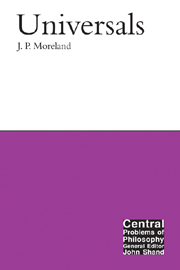Book contents
- Frontmatter
- Contents
- Preface and acknowledgements
- 1 The problem(s) of universals
- 2 Extreme nominalism and properties
- 3 Moderate nominalism and properties
- 4 Minimalist realism: Wolterstorff's kinds and Armstrong's properties
- 5 Traditional realism: properties are abstract objects
- 6 Traditional realism: issues and objections
- 7 The individuation of particulars
- Notes
- Bibliography
- Index
5 - Traditional realism: properties are abstract objects
- Frontmatter
- Contents
- Preface and acknowledgements
- 1 The problem(s) of universals
- 2 Extreme nominalism and properties
- 3 Moderate nominalism and properties
- 4 Minimalist realism: Wolterstorff's kinds and Armstrong's properties
- 5 Traditional realism: properties are abstract objects
- 6 Traditional realism: issues and objections
- 7 The individuation of particulars
- Notes
- Bibliography
- Index
Summary
In Chapters 2 and 3, reasons were given for rejecting extreme and moderate nominalist analyses of properties and property-instances. This provided justification for the claim that a realist analysis is the correct one. However, in Chapter 4 it became evident that there are different positions that claim to be realist ones. And two of those positions – Wolterstorff's and Armstrong's – were found to have serious problems sufficient to justify the search for a more adequate solution to the problem of universals. In this chapter, the focus will be two-fold. First, an analysis of the traditional realist construal of properties and property-instances will be offered and evaluated. In the process, it will become clear that an essential component of the traditional view is an assay of property-instances as complex entities. However, some philosophers opine that any ontology with property-instances over and above properties and concrete particulars is a moderate nominalist ontology. This claim is sometimes illustrated by proffering a moderate nominalist interpretation of Edmund Husserl's ontology. The second focus of the chapter is an analysis and rebuttal of the supposed connection between nominalism and property-instances in general, and moderate nominalism and Husserl in particular.
The traditional realist view of predication
Traditional realism, predication, and property-instances
To elaborate on a traditional realist understanding of properties and property-instances, recall our round, red spot, Socrates. According to traditional realism, a universal is a multiply exemplifiable entity that is a numerically identical constituent in each of its instances. Thus, instances are not simples for a traditional realist; they are complex entities.
- Type
- Chapter
- Information
- Universals , pp. 97 - 113Publisher: Acumen PublishingPrint publication year: 2001

